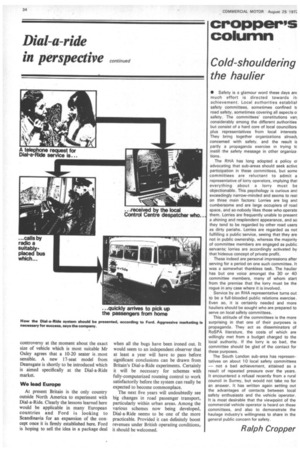cropper's column
Page 36

If you've noticed an error in this article please click here to report it so we can fix it.
Cold-shouldering the haulier
• Safety is a glamour word these days am much effort is directed towards it achievement. Local authorities establisl safety committees, sometimes confined tr road safety, sometimes covering all aspects o safety. The committees' constitutions van considerably among the different authorities but consist of a hard core of local councillors plus representatives from local interests They bring together organizations &reach concerned with safety, and the result is partly a propaganda exercise in trying tr instill the safety message in other organizations.
The RHA has long adopted a policy oi advocating that sub-areas should seek active participation in these committees, but SOME committees are reluctant to admit a representative of lorry operators, implying thai everything about a lorry must be objectionable. This psychology is curious and exceedingly narrow-minded and seems to rest on three main factors: Lorries are big and cumbersome and are large occupiers of road space, and so nobody likes those who operate them. Lorries are frequently unable to present a shining and resplendent appearance, and so they tend to be regarded by other road users as dirty pariahs. Lorries are regarded as not fulfilling a public-service, seeing that they are not in public ownership, whereas the majority of committee members are engaged as public servants: lorries are accordingly activated by that hideous concept of private profit.
These indeed are personal impressions after serving for a period on one such committee. It was a somewhat thankless task. The haulier has but one voice amongst the 30 or 40 committee members, many of whom start from the premise that the lorry must be the rogue in any case where it is involved.
Service by an RHA representative turns out to be a full-blooded public relations exercise. Even so, it is certainly needed and more hauliers should be sought who are prepared to serve on local safety committees.
This attitude of the committees is the more surprising in that one of their purposes is propaganda. They act as disseminators of RoSPA literature, the costs of which are willingly met from a budget charged to the local authority. If the lorry is so bad, the committee should be glad of the contact for these purposes.
The South London sub-area has representatives on about 10 local safety committees — not a bad achievement, attained as a result of repeated pressure over the years. It encountered a refusal recently from a rural council in Surrey, but would not take no for an answer. It has written again setting out the advantages of contacts between local safety enthusiasts and the vehicle 'operator. It is most desirable that the viewpoint of the commercial vehicle operator is heard on these committees, and also to demonstrate the haulage industry's willingness to share in the general public concern for safety.
Ralph Cropper




















































































